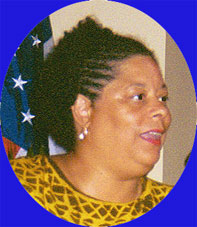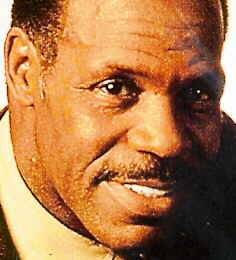
This story about Mel Gibson circulated through email.
Hey, and on top of this story should be the REAL LIFE story of Mel's lethal partner, DANNY GLOVER, who has been brutalized by the press for fighting for the civil rights of people around the world, especially in Africa. Mel's Passion for the last day of Jesus is commendable, but how relevant is it to the suffering of people who've been oppressed for centuries by the Christian Church members who are supposed to follow Jesus' example of LOVE?????

WORDS WE SPEAK - #2 Messages & Media
 MEL
GIBSON'S passion for
MEL
GIBSON'S passion for
"THE PASSION"
How ironic that when a
movie producer takes artistic license with historical events, he is
lionized as artistic, creative and brilliant, but when another takes
special care to be true to the real-life story, he is vilified.
Actor-producer Mel Gibson is discovering these truths the hard way as he
is having difficulty finding a United States studio or distributor for his
upcoming film, "The Passion," which depicts the last 12 hours of
the life of Jesus Christ.
Gibson co-wrote the script and financed, directed and produced the movie.
For the script, he and his co-author relied on the New Testament Gospels
of Matthew, Mark, Luke and John, as well as the diaries of St. Anne
Catherine Emmerich (1774-1824) and Mary of Agreda's "The City of
God."
Gibson
doesn't want this to be like other sterilized religious epics. "I'm
trying to access the story on a very personal level and trying to be very
real about it." So committed to realistically portraying what many
would consider the most important half-day in the history of the universe,
Gibson even shot the film in the Aramaic language of the period. In
response to objections that viewers will not be able to understand that
language, Gibson said, "Hopefully, I'll be able to transcend the
language barriers with my visual storytelling; if I fail, I fail, but at
least it'll be a monumental failure."
To further insure the accuracy of the work, Gibson has enlisted the
counsel of pastors and theologians, and has received rave reviews. Don
Hodel, president of Focus on the Family, said, "I was very impressed.
The
movie is historically and theologically accurate." Ted Haggard,
pastor of New Life Church in Colorado Springs, Colo., and president of the
National Evangelical Association, glowed: "It conveys, more
accurately than any other film, who Jesus was."
During the filming, Gibson, a devout Catholic, attended Mass every morning
because "we had to be squeaky clean just working on this." From
Gibson's perspective, this movie is not about Mel Gibson. It's bigger than
he is. "I'm not a preacher, and I'm not a pastor," he said.
"But I really feel my career was leading me to make this. The Holy
Ghost was working through me on this film, and I was just directing
traffic. I hope the film has the power to evangelize."
Even before the release of the movie, scheduled for March 2004, Gibson is
getting his wish. "Everyone who worked on this movie was changed.
There were agnostics and Muslims on set converting to Christianity...[and]
people being healed of diseases." Gibson wants people to understand
through the movie, if they don't already, the incalculable influence
Christ has had on the world. And he grasps that Christ is controversial
precisely because
of WHO HE IS - GOD incarnate. "And that's the point of my film
really, to show all that turmoil around him politically and with religious
leaders and the people, all because He is Who He is."
Gibson is beginning to experience first hand just how controversial Christ
is. Critics have not only speciously challenged the movie's authenticity,
but have charged that it is disparaging to Jews, which Gibson vehemently
denies. "This is not a Christian vs. Jewish thing. '[Jesus] came into
the world, and it knew him not.' Looking at Christ's crucifixion, I look
first at my own culpability in that." Jesuit Father William J. Fulco,
who translated the script into Aramaic and Latin, said he saw no hint of
anti-Semitism in the movie. Fulco added, "I would be aghast at any
suggestion that Mel Gibson is anti-Semitic." Nevertheless, certain
groups and some in the mainstream press have been very critical of
Gibson's "Passion."
The New York Post's Andrea Peyser chided him: "There is still time,
Mel, to tell the truth." Boston Glove columnist James Carroll
denounced Gibson's literal reading of the biblical accounts. "Even a
faithful repetition of the Gospel stories of the death of Jesus can do
damage exactly because those sacred texts themselves carry the virus of
Jew hatred," wrote Carroll. A group of Jewish and Christian academics
has issued an 18-page report slamming all aspects of the film, including
its undue emphasis on Christ's passion rather than "a broader
vision." The
report disapproves of the movie's treatment of Christ's passion as
historical fact.
The moral is that if you want the popular culture to laud your work on
Christ, make sure it either depicts Him as a homosexual or as an everyday
sinner with no particular redeeming value (literally). In our
anti-Christian culture, the blasphemous "The Last Temptation of
Christ" is celebrated, and "The Passion" is condemned. But
if this movie continues to affect people the way it is now, no amount of
cultural opposition will suppress its force and its positive impact on
lives everywhere. Mel Gibson is a model of faith and courage.
Please send these links to your cyberfriends to let them know about
this film and these issues:
2004 MOVIE - The 2000 Presidential Election
 The
Strange Conscience of Danny Glover
The
Strange Conscience of Danny Glover
Myles B. Kantor
Wednesday, May 14, 2003
When someone claims to defend human rights, you don’t expect him to defend tyrants.
Actor and MCI spokesman Danny Glover has often blended art and political concern – against apartheid South Africa, for instance. He starred in “Mandela” (1987), “Bopha!” (1993) and “Boesman and Lena” (2000), all of which depict apartheid as a brutal system.
The latter movie was based on the play by Athol Fugard, with whom Glover has had a long relationship. He said at the National Press Club on Nov. 12, 2002:
In the mid-'70s, I began to perform the works of Athol Fugard, a white South African playwright whose material was banned in his homeland because he delved into the psychological devastation of apartheid. … I have performed Fugard's work in community and regional theater, and on and off Broadway. Plays such as “The Blood Knot,” “Sizwe Bansi Is Dead,” “The Island,” “Boesman and Lena” and “Master Harold…and the Boys” put a face on life in apartheid South Africa.
Glover’s opposition to apartheid even manifested in movies unrelated to South Africa. In “Lethal Weapon” (1987), an anti-apartheid sticker appears on his character’s refrigerator. (The antagonists in “Lethal Weapon 2” are South African diplomats.)
It would seem that Glover cares deeply about freedom, especially the freedom of people of color.
It would seem.
Angel Moya Acosta, Dr. Oscar Elías Biscet, Iván Hernández Carrillo and Jorge Olivera were among 80 Cuban human rights activists convicted last month in a series of closed sham trials – “a judicial Tiananmen,” in the words of opposition member Manuel Cuesta Morua.
Acosta was sentenced to 20 years, Biscet to 25 years, Carrillo to 25 years and Olivera to 18 years.
What was their crime? Conscience, to witness evil and call it evil.
These men share a racial as well as moral nexus: They are black. People of color are a majority in Cuba, and they aren’t exempt from Fidel Castro’s despotism.
It is a crime for black Cubans to criticize this white tyrant, his henchmen or their dogma. Neither can they establish their own media or organizations. And like chattel on a plantation, they can’t leave Cuba without a pass. (When Americans consider foreign travel, issues such as cost and scheduling are of concern. Cubans worry if they will be allowed to travel and harmed for the desire.)
Eusebio Peñalver, a black Cuban exile who was a political prisoner from 1960 until 1988 – longer than Nelson Mandela (a Castro admirer), who was imprisoned from 1964 until 1990 – observes, “There is no difference between the Cuban dictator and Stalin, Mao, Hitler, Mussolini, Idi Amin, Pol Pot, or any of the dictators who have terrorized the peoples of the world.”
Former black prisoner of conscience Dr. Ramón Colás notes how the Castro regime “turned me into a modern slave, subjected to unjust laws, discriminatory practices which made me a non-person.”
Black Cubans such as Dr. Biscet and Jorge Olivera have been fundamental to the Cuban human rights movement. Others include prisoner of conscience Jorge Luis García Pérez and dissidents in exile such as Vicky Ruiz Labrit and Marcos Lázaro Torres León.
Has Danny Glover denounced the sentences perpetrated against these heroic black Cubans? Has he denounced the systematic violation of black Cubans’ human rights?
On the contrary, Glover’s solidarity is for the man who subjugates black Cubans.
Glover signed a letter released last month entitled “To the Conscience of the World,” which states in part:
At this very moment, a strong campaign of destabilization against a Latin American nation has been unleashed. The harassment against Cuba could serve as a pretext for an invasion. Therefore, we call upon citizens and policy makers to uphold the universal principles of national sovereignty, respect of territorial integrity and self-determination, essential to just and peaceful co-existence among nations.Addressing this defense of Castro, the late Mexican poet and essayist Octavio Paz wrote in 1994 how
many Latin-American intellectuals, obliterated by the seduction of ideology, still defend Castro in the name of the principle of non-intervention. Do they perhaps ignore the fact that this principle is based on another, the “freedom of self-determination”? A freedom that Castro, for more than thirty years, has refused the Cuban people.Indeed, those who speak of self-determination in totalitarian regimes like Cuba’s might as well speak of squares with three sides. Totalitarianism’s essence is the suffocation of choice by a colossal apparatus of terror.
With Glover there’s also the irony of his call to respect totalitarian Cuba’s “sovereignty” when he vigorously sought to destabilize apartheid South Africa. Apparently this “universal principle” isn’t so universal for him.
Glover has also visited Cuba many times and met Castro. The state-controlled Cuban “newspaper” Granma International noted last May: “There’s an intense relationship between Danny Glover and Havana. It was love at first sight, and not only has it stood the test of his frequent visits, but it is growing deeper and deeper, through discoveries and affinities.”
Castro’s black victims from Havana like Dr. Biscet, however, haven’t been among those discoveries and affinities.
Black journalist Clarence Page writes of Castro’s latest victims: “They look to us in their hour of need and to the other freedom-loving people on this planet. We must not let them down.”
Danny Glover not only has let these heroes down, he also has allied with their oppressor. People who love freedom don’t do that.
Contact Myles Kantor at kantor@FreeEmigration.com.
Read more on this subject in
related Hot Topics:
Castro/Cuba
Editor's note:
"Let
Freedom Ring" – Sean Hannity reveals how to triumph over the left
– Click Here Now!
As guest speaker at
an anti-death penalty forum at Princeton University, Glover said America
was the one to blame for bombing and terror around the world.
http://www.zwire.com/site/Danny_Glover.html